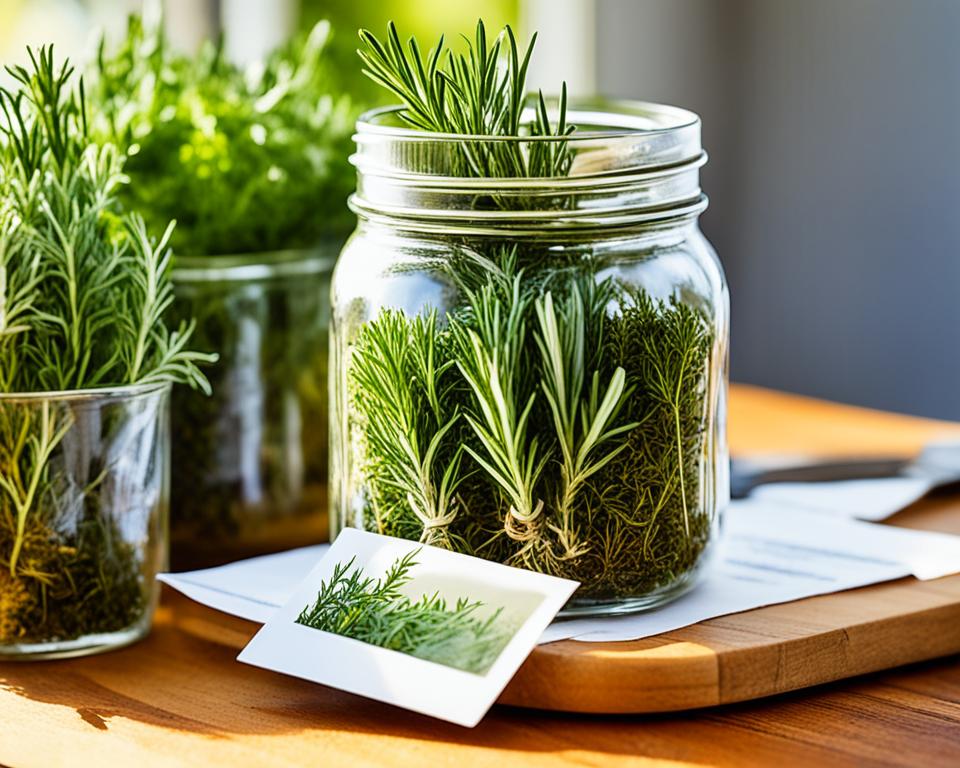Fresh Herbs Preservation: How To Make Herbs Last for Weeks
Storing fresh herbs properly is essential to ensure their freshness and flavor for an extended period. With the right techniques, you can make fresh herbs last for weeks, saving both food and money. By following these tips, you can preserve your herbs and enjoy their freshness for a longer time.
Are you tired of your herbs wilting and losing flavor after just a few days? We’ve got you covered! In this article, we will share effective methods to keep your herbs fresh and flavorful for weeks.
When it comes to preserving herbs, understanding the differences between soft herbs and hardy herbs is crucial. Soft herbs, such as parsley, cilantro, dill, mint, and basil, have delicate leaves and tender stems. On the other hand, hardy herbs like rosemary, thyme, and oregano have tougher leaves and woody stems. Each type requires specific storage methods to maintain their freshness.
If you have soft herbs on hand, such as parsley or cilantro, you can store them for an extended period of freshness. One method is the water method. Remove any rubber bands or fastenings, wash the herbs in cool water, dry the leaves thoroughly, trim the stems, and place the herbs in water as if they were a bouquet of flowers. Cover the leaves with a recycled bag and refrigerate. By changing the water every few days and giving the stems a small trim, you can further extend the freshness of your soft herbs.
For hardy herbs, like rosemary and thyme, the damp paper towel method is ideal. After washing and drying the herbs thoroughly, trim the stems and wrap them in a damp paper towel. Place them in a plastic zipper-lock bag and store them in the refrigerator. Remember to re-moisten the paper towel as needed to keep the herbs hydrated.
Looking for a long-term herb preservation solution? Freezing is the way to go. For hardy herbs, wash and dry them before placing them in a labeled, resealable freezer bag. On the other hand, soft herbs can be frozen in oil. Simply wash, dry, and chop them, then add them to ice cube trays with extra virgin olive oil. Once frozen, transfer the herb cubes to a freezer-safe bag. You can also blanch and freeze basil for later use.
By employing these simple techniques, you can enjoy the freshness of your herbs for weeks on end. No more waste or disappointment when your herbs spoil too soon. Start preserving your herbs today!
Differentiating Between Soft and Hardy Herbs
When it comes to storing herbs, it’s crucial to differentiate between soft herbs and hardy herbs. This is because each type requires different storage methods to maintain their freshness and flavor for as long as possible.
Soft herbs include varieties like parsley, cilantro, dill, mint, and basil. These herbs have tender stems and delicate leaves, which means they require extra care when storing. On the other hand, hardy herbs such as rosemary, thyme, and oregano have woody stems and tougher leaves, making them more resilient and easier to store.
By understanding the distinction between these two types of herbs, you can ensure that you’re using the correct preservation methods and prolonging the lifespan of your herbs.
“The difference in texture and hardiness between soft herbs and hardy herbs is what dictates their storage needs.”
Soft Herbs
Soft herbs, with their delicate nature, require a specific approach to maintain their freshness. Here are a few simple steps to store soft herbs:
- First, remove any rubber bands or fastenings from the herbs.
- Next, gently wash the herbs in cool water to remove any dirt or debris.
- Dry the leaves thoroughly, either by gently patting them with a clean kitchen towel or by using a salad spinner.
- Trim the ends of the stems to remove any damaged or wilted parts.
- Place the herbs in a jar or container with a shallow layer of water, just like a bouquet of flowers.
- Cover the leaves with a recycled plastic bag to create a mini greenhouse effect.
- Store the herbs in the refrigerator, changing the water every few days to keep it fresh.
Hardy Herbs
Hardy herbs, with their sturdy and robust nature, can withstand longer storage periods. Here’s how to store hardy herbs for prolonged freshness:
- Start by washing the herbs gently and drying them thoroughly to remove any moisture.
- Trim the stems slightly to ensure they fit in your storage container without being too crowded.
- Wrap the herbs in a damp paper towel to help retain moisture.
- Place the wrapped herbs in a plastic zipper-lock bag, removing any excess air before sealing.
- Store the bag in the refrigerator’s crisper drawer or in a section with a consistent temperature.
- Re-moisten the paper towel as needed to maintain proper hydration.
By following these storage methods, you can keep your soft herbs and hardy herbs fresh for an extended period, ensuring that their flavors and aromas enhance your culinary creations.
Storing Soft Herbs for Extended Freshness
When it comes to soft herbs like parsley, cilantro, and mint, proper storage is key to maintaining their freshness for up to two weeks or more. By following these simple steps, you can ensure that your soft herbs stay vibrant and flavorful for an extended period:
- Remove rubber bands or fastenings: Start by gently removing any rubber bands or fastenings from the bunch of herbs.
- Wash the herbs in cool water: Rinse the herbs thoroughly in cool water to remove any dirt or debris. Be gentle to avoid damaging the delicate leaves.
- Dry the leaves very well: After washing, make sure to dry the leaves completely. Excess moisture can cause the herbs to spoil quickly. A salad spinner or paper towels can be used for effective drying.
- Trim the herbs: Trim any discolored or wilted leaves from the herb stems. This will help maintain the freshness and appearance of the herbs.
- Put the herbs in water like a bouquet of flowers: Treat your soft herbs like a beautiful bouquet by placing the herb stems in a jar or glass filled with cool water. This method helps the herbs stay hydrated and fresh.
- Cover the herb leaves with a recycled bag: To maintain the moisture and prevent the herbs from wilting, cover the herb leaves loosely with a clean, recycled plastic bag.
- Refrigerate: Finally, place the jar or glass with the covered herb leaves in the refrigerator. The cool temperature will help extend the freshness of the soft herbs.
Remember to change the water every few days and give the stems a small trim to further prolong the freshness of your soft herbs. With these simple techniques, you can enjoy the vibrant flavors of your favorite soft herbs in your culinary creations for weeks to come.
“Proper storage is key to maintaining the freshness and flavor of soft herbs.”
Storing Hardy Herbs for Prolonged Shelf Life
Hardy herbs, such as rosemary, thyme, and sage, can be stored in the refrigerator for up to three weeks or longer. To ensure the longevity of these herbs, follow these simple steps:
- Wash and dry: Start by washing the herbs under cool water. Gently pat them dry using a clean kitchen towel or paper towels. Ensuring that the herbs are dry is crucial to prevent mold and decay.
- Trim the stems: Remove any excess stems or leaves that may have deteriorated. This will help maintain the quality and freshness of the herbs.
- Damp paper towel method: Take a clean paper towel and dampen it slightly with water. Wrap the herbs in the damp paper towel, covering them completely. This will provide the necessary moisture to keep the herbs hydrated throughout their storage.
- Plastic zipper-lock bag: Place the wrapped herbs in a plastic zipper-lock bag to create a sealed environment. This will help prevent the herbs from absorbing any odors from the refrigerator and maintain their distinct flavors.
- Refrigerator storage: Store the bag of herbs in the refrigerator, preferably in the crisper drawer or a designated herb storage container. The cool temperature of the refrigerator will slow down the herb’s natural deterioration process, extending their shelf life.
Remember to re-moisten the paper towel if it becomes dry during storage. This will ensure the herbs stay hydrated and maintain their freshness for as long as possible.
Freezing Herbs for Long-Term Preservation
Freezing herbs is an excellent method to preserve their freshness and flavors for an extended period. Whether you have hardy herbs like rosemary, thyme, or oregano, or delicate soft herbs like parsley, cilantro, or mint, freezing them can ensure that you have access to their vibrant taste even during the winter months.
For hardy herbs, the freezing process is simple. Just wash and dry the herbs thoroughly, remove any excess moisture, and place them in a labeled, resealable freezer bag. This method allows you to conveniently store the herbs and use them whenever needed, without the risk of spoilage.
If you have soft herbs, such as basil or dill, freezing them in oil can be a great option. Start by washing, drying, and chopping the herbs. Then, fill an ice cube tray with extra virgin olive oil and add the chopped herbs to each compartment. Freeze the tray until the oil solidifies, and then transfer the herb-infused oil cubes to a freezer-safe bag or container. This method preserves the delicate texture and aromas of soft herbs, making them readily available for your culinary creations.
For basil, an alternative freezing method involves blanching the leaves for a few seconds in boiling water, followed by immediately transferring them to an ice bath to stop the cooking process. Once chilled, place the blanched basil leaves in a single layer on a cookie sheet and freeze until solid. Finally, store the frozen basil in a freezer-safe bag for long-term freshness.
Freezing herbs not only helps extend their shelf life but also allows you to enjoy their vibrant flavors even when they are out of season. With the right freezing method, you can ensure your herbs retain their freshness, making them a valuable addition to your culinary endeavors throughout the year.







